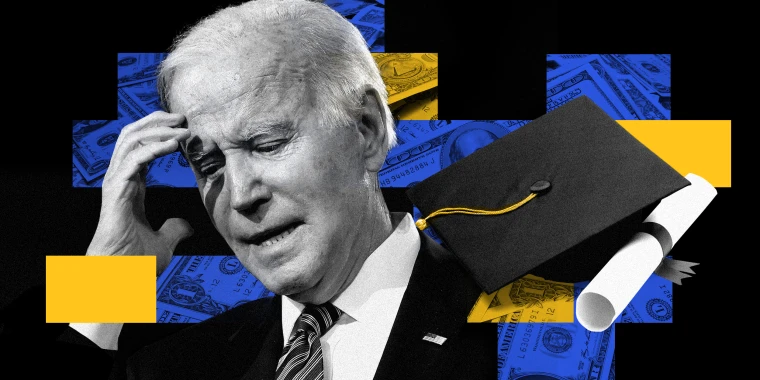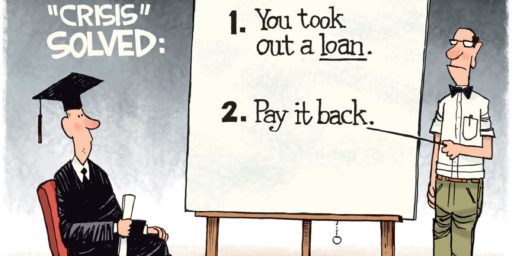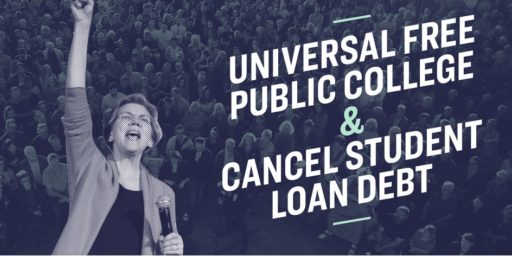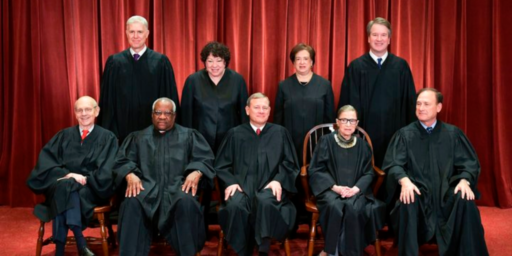Biden Student Loan Forgiveness in Danger
The Supreme Court's conservative majority is signaling an unfavorable ruling.

Reading ideological analyses of legal cases can be amusing, showing radically different interpretations of the questions with very little meeting in the middle. Such is the case with Vox‘s Ian Millhiser and Volokh Conspiracy‘s Ilya Somin as they look at yesterday’s oral arguments before the Supreme Court on President Biden’s backdoor waiver of student loan debt.
Millhiser (“You probably won’t get any student loan relief, thanks to a GOP-controlled Supreme Court“):
On Tuesday, the Supreme Court heard oral arguments in two cases, Biden v. Nebraska and Department of Education v. Brown, that ask the Court to strike down the student loan relief program. That program would provide $10,000 in relief to most borrowers who earned less than $125,000 a year during the pandemic, and $20,000 in relief to borrowers who received Pell Grants.
The Brown case is laughably weak, and no justice appeared to believe that federal courts have jurisdiction to hear this case. But the Supreme Court only to needs to assert jurisdiction over one of these two cases to kill the loan relief program, and the Court appeared likely to split along party lines in the Nebraska case. Though there is an off chance that Justice Brett Kavanaugh or Amy Coney Barrett might break from their fellow Republican appointees, all six of the GOP-appointed justices appeared inclined to kill the program.
And even if the Biden administration did convince Kavanaugh or Barrett to vote in their favor, that would not be enough. The administration would need both of their votes to prevail.
Here, Millhiser is commenting on the standing issue: whether the states in question have a case in controversy that entitles them to sue. Somin treats that as a secondary issue to the merits but agrees that it’s the best chance for Biden to prevail:
From early on, I have thought that the Biden Administration’s best chance to save this policy is by winning on standing. Today’s arguments confirm that.
The plaintiffs in the two cases advance various theories of standing. But by far the strongest is that of the state of Missouri, based on the fact that Missouri has a state agency called the Higher Education Loan Authority of the State of Missouri (MOHELA), which services many federally backed student loans and stands to lose money if some of those loans are forgiven.
Interestingly, Prelogar today conceded that MOHELA would have standing if it brought the case itself! But she argues that the state of Missouri lacks standing to bring a case on MOHELA’s behalf, because the latter has an independent corporate status, and has the legal right to sue and be sued. In my view, this overlooks the reality that MOHELA is a state agency fulfilling public functions, that it is owned by the state, and thus any financial losses suffered by MOHELA are also suffered by Missouri. The fact that there is some administrative separation between MOHELA and other state agencies is irrelevant.
Nonetheless, the three liberal justices seemed to buy this argument. Conservative Amy Coney Barrett may also agree with it. She repeatedly pressed this issue today. At one point, she asked Nebraska Solicitor General Jim Campbell “[i]f MOHELA is an arm of the state, why didn’t you just strong-arm MOHELA and say you’ve got to pursue this suit?” It’s a reasonable question, and Campbell didn’t deal with it well, saying that it’s “a question of state politics.”
A better response is that, while the state attorney general may not have the power to order MOHELA to file a lawsuit, that does not change the fact that MOHELA is owned by Missouri, and therefore that financial losses to MOHELA are also losses to the state. The state government can limit the power of one state agency (the AG’s office) to control another (MOHELA). But that doesn’t change the fact that the state ultimately owns and controls both. While the AG may not have the authority to issue orders to MOHELA, he does have the power to bring lawsuits on behalf of the state as a whole, to advance any of the state’s interests—including those involving the assets of administratively independent state agencies.
It is not entirely clear which way Justice Barrett will go on this issue. While she posed probing standing questions to Campbell, she also at one point suggested that Missouri may get standing simply on the basis that it owns MOHELA.
The other five conservative justices said little about Missouri’s standing. If they were inclined to rule against the plaintiffs on this basis, I would expect them to push the issue much more.
Some of the conservatives also seem open to other arguments for standing advanced by the plaintiff states, such as more indirect financial losses they might suffer. Justice Neil Gorsuch noted that a majority of the Court had granted state standing in Department of Commerce v. New York, the 2019 case challenging the legality of the Trump Administration’s plans for the 2020 census, on the basis that “undercounting the state’s population “would have potential effects to the State of New York in the term—in terms of the benefits it might later receive, that kind of knock-on effect was sufficient to constitute standing in that case.” In addition, if a majority of justices thought that no plaintiff has standing, they would probably not have left in place the lower court injunctions blocking implementation of the loan forgiveness plan.
For all these reasons, I think at least five conservative justices will ultimately conclude that at least one plaintiff in Biden v. Nebraska (probably Missouri) does have standing. If so, they are likely to rule against the program on the merits. But I admit there is much more uncertainty on this issue than on the merits.
As I have pointed out before, the Biden Administration and its supporters have—in this case—been pushing ultra-narrow theories of standing traditionally associated with the political right. Those theories were wrong when advanced by conservatives, and are still wrong today.
He actually has several more paragraphs on the matter and, honestly, I have no strong opinion on the matter. Standing is very much an inside baseball legal issue and, in cases with such widespread implications, justices tend to find a way to grant it when they want to rule on the matter and deny it when they don’t.
My preference here, like Somin’s, is for the Court to issue a ruling on the merits. This isn’t some disgruntled citizen suing because he paid back his loan and he objects to others getting a free ride. The states have a stake in the outcome here.
Regardless, the argument on the merits is more interesting and, again, the two diverge considerably.
Millhiser:
The justices are likely to strike down the program, moreover, despite the fact that the federal Heroes Act explicitly gives Secretary of Education Miguel Cardona broad authority to “waive or modify” many student loan obligations “as the Secretary deems necessary in connection with a war or other military operation or national emergency,” such as the Covid-19 pandemic. As it turns out, the most important question in American law is not what the law actually says, it is whether the nine justices on the Supreme Court think the policy is a good idea.
Almost immediately after the argument began, the justices split into two partisan camps. The Court’s three Democratic appointees largely argued that the judiciary’s job is to follow the text of federal law. As Justice Elena Kagan put it at one point, the Heroes Act is “really quite clear here” that this student loan forgiveness program is allowed. Under this approach, that should be the beginning and the end of the Court’s inquiry (although it’s worth noting that the three Democratic justices also asked questions suggesting that they do not believe that federal courts have jurisdiction to hear this case).
A handful of questions by Kavanaugh and Barrett aside, the six Republican appointees spent much of the argument fixated on concerns that if this student debt relief program is upheld, then the Biden administration would have too much power. Notably, US Solicitor General Elizabeth Prelogar received some of the harshest questions from Chief Justice John Roberts — ordinarily the most moderate member of the Court’s Republican bloc — who immediately criticized the size of the program because, he claimed, it will lead to “half-a-trillion dollars” in loan obligations being waived.
The Court’s Republican appointees spent much of the argument discussing policy disagreements with President Biden that have nothing whatsoever to do with the question of whether this loan forgiveness program is legal. Roberts, along with Justices Samuel Alito and Neil Gorsuch, for example, all took turns criticizing Prelogar’s position because this loan program benefits student borrowers and not, say, someone who took out a loan to start a lawn care business.
The obvious response to this legally irrelevant objection to this program is that, as Justice Kagan pointed out, “Congress passed a statute that deals with loan repayment” for student borrowers, and it didn’t pass a statute that provides loan forgiveness to people who own lawn care businesses.
But, if Tuesday’s argument is any sign, Roberts, Alito, and Gorsuch’s disagreements with the Biden administration’s policy are likely to trump the actual text of the Heroes Act.
Somin:
Various conservative justices repeatedly signaled they have doubts that the HEROES Act authorizes the Biden plan, both because the power to “waive or modify” student loan conditions does not include large-scale cancellation of debt principal, and because many of the 40 million potential beneficiaries of the plan are not actually “in a worse position financially in relation to” their student loan obligations as a result of the Covid-19 pandemic, as the statute requires in order for the power to “waive or modify” to be authorized by the Covid national emergency declaration. In my view, the latter is the biggest legal weakness of the plan.
Chief Justice John Roberts cited evidence indicating that more than half of the potential beneficiaries do not believe they will have any trouble repaying their student loans. Of the remainder, many have issues unrelated to the impact of the pandemic. While the Solicitor General Elizabeth Prelogar rightly pointed out that the statute does not require “case-by-case” assessment of each individual, such massive overreach—covering tens of millions of people and hundreds of billions of dollars—seems obviously beyond what the statute authorizes.
The conservative justices—and at least one liberal—also signaled they believe the “major questions doctrine”—which requires Congress to “speak clearly when authorizing an [executive branch] agency to exercise powers of vast economic and political significance”—is applicable here. Justice Sotomayor (who was sympathetic to the government on almost every other point), rightly pointed out that “the amount at issue, the Chief [Justice] mentioned the quarter [of] a trillion dollars or the half a trillion dollars… seems to favor the argument that this is a major question.”
None of the justices seemed sympathetic to Prelogar’s argument that the major questions doctrine applies only to regulations, but not to federal benefits. Chief Justice Roberts noted that this ignores the fact that the purpose of doctrine is to protect separation of powers across the board. Justice Alito commented that “drawing a distinction between benefits programs and other programs seems to presume that when it comes to the administration of benefits programs, a trillion dollars here, a trillion dollars there, it doesn’t really make that much difference to Congress.”
The Court need not resort to the major questions doctrine to rule against the administration. It could just make that decision based on the text of the HEROES Act. But the doctrine raises the burden of proof the administration must meet. If the loan forgiveness policy qualifies as resolving a “major question” (and the immense size of the expenditure suggests that does!) the government must not only show that the statute authorizes the policy, but that it does so “clearly.” If the Court concludes the statute is ambiguous, the federal government will lose.
Rather obviously, given the lengths to which both parties* go to create a streamline of ideologically-favorable judges in the federal pipeline and then select a young one when a Supreme Court vacancy opens—not to mention imploring oldish Justices on their side to retire so they can be replaced by younger ones, cementing that vote for decades—it’s silly to think Justices are impartial oracles simply divining the law. They come to the table with biases, as do we all.
Regardless of the policy merits of the loan forgiveness program—on which my views are complicated—I tend to agree with the conservatives here both that Biden’s Executive Order (via his Education Secretary) here goes well beyond the scope of the HEROES Act** and that, in any case, Presidents and their plenipotentiaries ought not to be able to spend hundreds of billions of dollars without Congress specifically authorizing it. The fact that it’s damned near impossible to get anything through Congress even when the President’s party held, as it did at the time, razor-thin majorities in both Houses doesn’t alter the Constitution.
Still, I concede that these are not slam dunk questions.
Millhiser:
The Heroes Act speaks in expansive terms about the Secretary of Education’s power to forgive student loans, at least in response to a national emergency. Under this law, “the Secretary is authorized to waive or modify any provision” of the federal laws governing student loans — including the provisions governing borrowers’ obligation to repay their loans, and the provisions governing cancellation of student loans. This power, moreover, may be exercised “as the Secretary deems necessary in connection with a war or other military operation or national emergency.”
Additionally, Congress took several additional steps to make sure that the secretary could act quickly to forgive student loans. Frequently, for example, federal law requires government agencies to undergo a time-consuming process known as “notice and comment” before they can alter federal policy. But the Heroes Act explicitly exempts the secretary’s power to waive or modify loans from this process.
[…]
Additionally, the Heroes Act provides that “the Secretary is not required to exercise the waiver or modification authority under this section on a case-by-case basis” — thus allowing him to dole out loan relief en masse to many borrowers at a time.
Again, I agree with Somin that the pandemic served here as a ruse. But it did in fact happen. Whether the Secretary had a duty to take some care that forgiveness was targeted to those unable to pay because of the pandemic is a justiciable question.
All of this said, the Supreme Court has, in recent years, developed a doctrine that it uses to strike down federal policies created by a government agency, even when those policies are explicitly authorized by an act of Congress. This doctrine, known as “major questions,” provides that Congress must “speak clearly if it wishes to assign to an agency decisions of vast ‘economic and political significance.’”
So, when Roberts almost immediately brought up the fact that this particular loan forgiveness program will impact many borrowers and will save them a whole lot of money, he was speaking the language of this major questions doctrine. The whole idea behind the doctrine is that big government programs are inherently suspect, at least when they are promulgated by a federal agency.
Look, I agree that this is a core ideological question. Conservatives prefer less expansive government power than liberals. But it’s also a legitimate Constitutional one: at what point does the Executive branch go from simply interpreting and implementing power delegated to it by Congress to a quasi-legislature of its own?
It should be noted that, even on its own terms, the major questions doctrine only requires Congress to “speak clearly” if it wants to expansive powers to a federal agency. And, as Justice Kagan noted during oral argument, “Congress doesn’t get much clearer” than the Heroes Act.
Again, there’s a real dispute as to whether the order followed Congressional intent or merely used the pandemic as figleaf to pass a massive spending bill the administration otherwise had no chance of getting through Congress. Indeed, Biden tried very hard to get Congress to incorporate student debt relief into his other massive pandemic relief plans and couldn’t even get all of his party’s Senators on board.
But this doctrine itself isn’t very clear; the Court hasn’t laid out how “clearly” Congress must speak, or what does or does not constitute a matter of “vast ‘economic and political significance.’” Moreover, the Court hasn’t exactly applied this major questions doctrine in a principled way. In West Virginia v. Environmental Protection Agency (2022), for example, the Court struck down a regulation that never took effect, and that likely would have accomplished nothing at all, on the grounds that it involved a matter of “vast ‘economic and political significance.’”
Again, I don’t doubt that the conservative Justices have an agenda here, if one rooted in ideology. But it’s also true that Presidents have increasingly turned to governing by fiat as a workaround a sclerotic Congress. We may simply be in a phase, as we were with the various obscenity cases in the 1970s, where the Court is fleshing out a doctrine on a case by case basis on an “I know it when I see it” construct. That’s frustrating, to be sure, but hardly unprecedented.
________________
*I stipulate that the gambit by which the vacancy created by Justice Scalia’s death was held open, denying President Obama a vote on his highly-qualified and reasonably moderate nominee, Merrick Garland, in the hope that a Republican would win the 2016 election was an extreme case. But, while I opposed the move as dirty pool, it is evidence in support of my position.
**I hereby reiterate my disdain for cutesy names designed to make bills un-opposable.






So in your mind, California could sue gun manufacturers under the theory that people getting shot reduces the state’s ability to collect tax dollars from them and this represents a litigatable injury to the state?
Is the defense acquisition process unconstitutional, since it spends hundreds of billions of dollars without congress choose which contracts to spend it on?
Well depends on what the issue is. Are you doing a stage play based on “Too Wong Foo, Thanks for Everything! Julie Newmar”? Then they will shut you down. Want to use abortion medication? nope, that’s regulated. How about talking about slavery as anything but a positive goody good thing for the US of A!!!! Child labor, elevating Christian doctrine in law.
The idea that Republicans want less government is a outright lie. The GOP is hostile to anything that even hints at accountability for business. That is not a less expansive government that is government abandoning it’s charter to promote domestic tranquility.
I don’t have a dog in this fight.
I paid my loans for a undergrad and a graduate degree. But times were different…I think I paid $16K total for my Graduate studies at UCLA, but my significant other was working in a high-paying job and so housing food etc. was covered.
It does seem like the economic benefits of this so far outweigh the downside that from were I sit it seems like a no-brainer. The people who receive this forgiveness are just going to spend that money on rent and food and car payments.
I think it is true that Congress should act on this. But given the Clown Caucus, in the 118th Congress, that is NEVER going to happen.
At the end of the day it boils down to the Democrats again trying to help American people who need help, and Republicans are not only un-interested, but lack any policies at all to do the same.
There has always been a rainbows and ponies aspect to those who advocated that the administration can ameliorate the student loan problem through executive action, A legal challenge was inevitable and with a SC that is bent (selectively) on reining in bureaucratic action, almost guarantees that student loan relief will be struck down.
We’re in this situation because, once again, congress can’t address a problem that America faces. At the end of the day, the administration’s student loan relief was always a kluge that deals with the symptoms of the problem, but does nothing to resolve the cause. Changing the student loan system has to come from congress and any relief should as well.
Biden’s debt gambit, while well intended and needed, is bound to fail
@daryl and his brother darryl:
Alas, that is exactly why the elements who oppose the proposal do so. Economic and social mobility must be kept exclusively for the benefit of those who can use it well and wisely. We can’t have a bunch of [racial epithets, deleted] and po’ white trash moving up out of the sh*tholes they belong in. It just isn’t right.
ETA:
I recall seeing plenty of Democrats–including people on these very threads staking out the same positions*. It’s not just Republiqans.
*All y’all feel free to jump raht in with your “wuzzunt me, no huh, cracker be lyin'”s any time.
T.S. Eliot, political prognosticator. 😉
@Just nutha ignint cracker:
You lost me on that…explain?
I guess I’ll have to defer to Roberts’ expertise on the major questions doctrine. He’s one of the originalists who made it up out of thin air.
“ut it’s also true that Presidents have increasingly turned to governing by fiat as a workaround a sclerotic Congress. We may simply be in a phase, as we were with the various obscenity cases in the 1970s, where the Court is fleshing out a doctrine on a case by case basis on an “I know it when I see it” construct. That’s frustrating, to be sure, but hardly unprecedented.”
The difference, of course, is that presidents can be voted out of office or, in extreme cases, impeached and removed. The “justices” who have decided that only they have the right to make laws for this country are there for life.
Student loan forgiveness is like bailing water on a boat. It’s necessary and it helps, but doesn’t address the root problem. The boat is still sinking.
@daryl and his brother darryl: The position against student loan forgiveness. As I recall, some on this site were saying that when Democrats lost the Congress it would be because Biden was going all progressivie with student loan forgiveness, “Latinx,” and assorted other extreme lefty unmoderateness. Loan forgiveness objection is not just a Republiqan thing.
@Stormy Dragon:
Congress appropriates money for specific programs.
@Rick DeMent: Less regulatory power is, pretty much by definition, less government. It might have really bad consequences but it’s still less government.
@gVOR08:
In fairness, it’s an attempt at squaring the practical realities of an administrative state in the post-industrial age with the provisions of an 18th Century legal framework. Congress can’t literally legislate everything or make every spending decision in the way the Framers envisioned. So how do you balance the need to delegate with the basic tenets of Separation of Powers and Checks and Balances? The doctrine is an attempt to do that. I have no strong opinion as to whether it’s the right way to do it.
@wr:
I have argued for the 40 years that I’ve cared about such things that the courts have too much say in our politics. But the conservatives are simply reining in the growth of Executive power. Again, I don’t know where the line should be drawn by I tend to agree that, if we’re going to forgive massive amounts of student loan debt, Congress, not the DOE, should set the broad parameters of that.
I’m tired of playing the game where we pretend the Republican arguments are good faith sincerely held principles.
There’s no principle at work here other than hostility to the group which stands to benefit.
That’s it.
It should be noted that the stance that SCOTUS is taking in this case is pretty much the same one they took against the Trump administration in Department of Homeland Security v. Regents of the University of California, when Trump tried to unilaterally rescind DACA.
[emphasis added]
@Chip Daniels: If you had a more dog-whistley way of saying that, you could be on news interview shows.
@James Joyner:
What’s interesting is that conservatives in the judicial branch are for reining in the executive, while conservatives that become part of the executive, promote the concept of a unitary exec, where there are few limits on exec power.
@daryl and his brother darryl:
I similarly don’t have a dog in the fight but must ask how certain we are of the economic benefits. If loan forgiveness recipients suddenly have several thousand more dollars to put into food or rent or whatever, how does that impact inflation and pricing within those markets?
@James Joyner:
Perhaps instead of a handful of unelected judges making up rules based on their personal whim, congress could debate and vote on some sort of act defining the administrative procedures governing their delegations of power?
@Kazzy: Where I live, I’m not certain that it creates additional impact. Rents are already mostly outside the reach of working class and entry professionals/tech workers, so most of them may still end up living in tents or shelters.
@Just nutha ignint cracker:
I’m not well-versed on the program. Is it means-tested in any way? Or does anyone with loans qualify? I was fortunate enough to graduate without loans but had many friends who had significant loans. Most of these folks got decent-to-good-to-great jobs after college but had to scale back their spending to pay off their loans. For some this meant living at home while paying several thousand per month. For others, it meant living (with me!) in a basement apartment on the outskirts of a city. All of these folks would have spent considerably more on housing if they hadn’t had to make loan payments. How many such people exist now who would receive forgiveness?
@Chip Daniels:
Cleek was right. Liberals are in favor of debt relief today so conservatives are opposed to it. Today.
Can the Biden administration just keep deferring the former-students’ payments indefinitely, 6 months at a time?
Let the next Republican administration deal with making millions of voters pay more if they really want to.
@Kazzy: My recollection is that it was capped at a point where it probably won’t be much assistance to people who owe hundreds of thousands of dollars in loans. The cap was on the order of something like $20k. Maybe 50, I really don’t remember.
“Are the Justices’ methods…unsound?”
“I don’t see any method at all, sir.”
@Just nutha ignint cracker:
$10k for standard loans for those earning under $125k
$20k for Pell Grants, same earning limit (which… isn’t a grant a… y’know.. grant? Not a loan?)
@James Joyner: “But the conservatives are simply reining in the growth of Executive power.”
Not in this case. The conservative members weren’t talking about issues of executive power — they were debating whether or not the loan forgiveness is good policy. That is literally legislating from the bench — deciding what the outcome should be not based on the law but on their own opinion of the outcome.
Yeah… it’s quite curious seeing the “balls and strikes” crowd talking about “fairness.” I thought it was the liberal justices who were more concerned about outcomes rather than the letter of the law. This is just a perfect example of SCOTUS becoming a legislative arm of the GOP as opposed to a neutral arbiter. I suppose I should get used to it.
JFC the law explicitly says in the text that the President can waive or reduce loans in case of an emergency. COVID was an emergency. This just shows the Republican political hacks on the court are unrestrained by anything and make lawless decisions that are explicitly in violation of the clear text of the law. It is that simple. Any attempts to complicate it are bad faith efforts to excuse political hackery and an amoral exercise of political power.
@Stormy Dragon:
The administration didn’t follow the APA in this case, explicitly declaring that they had the power to do this without public notice pursuant to the HEROES Act.
@Sleeping Dog:
I’m not a believer in the unitary executive theory but it’s about the degree to which the President’s powers over the Executive branch can be constrained by Congress. But recall that the Roberts Court routinely struck down Trump Administration actions for violations of the aforementioned Administrative Procedures Act.
@Mu Yixiao: Pell Grants are not large enough to cover the full cost of attendance. Since the folks who get Pell Grants are on the lower socioeconomic end, recipients also take out loans to cover the gap.
The second tier allows for additional loan forgiveness on the loans taken out by Pell Grant recipients.